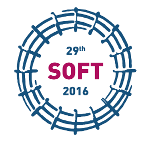Speaker
Yeanjin Kim
(quantum energy chemical engineering)
Description
The hydrogen isotope storage and delivery system (SDS) is a part of a nuclear fuel cycle. It is a complex system that is composed of numerous components such as a metal hydride bed, measuring tank, and other essential components. Depleted uranium (DU) was chosen as a hydrogen isotope storage material because of its rapid reactivity. We designed and manufactured the DU hydride bed to store the hydrogen isotopes and supply them to the nuclear fusion reactor. The hydrogen recovery performance of the bed was evaluated through both experimental and numerical investigations to determine the best recovery environment. In this study, we consider the effect of the inner temperature of the DU hydride bed on the hydrogen recovery performance. The inner temperature of the DU hydride bed was controlled using a proportional–integral–derivative (PID) controller to experimentally determine the overall effect. Two empirical equations for the pressure-composition-temperature (PCT) curve and the for hydrogen atomic ratio in DU hydride were reformulated and were used to predict the effect numerically.
Co-authors
Do-Hee Ahn
(nuclear fuel cycle process development, KAERI(Korea Atomic Energy Research Institute), Yuseong, Daejeon, South Korea;quantum energy chemical engineering, UST(University of science&technology), 217, Gajeong-ro, Yuseong-gu, Daejeon, 34113, South Korea)
Hee-Suk Kang
(nuclear fuel cycle process development, KAERI(Korea Atomic Energy Research Institute), Yuseong, Daejeon, South Korea)
Hongsuk Chung
(nuclear fuel cycle process development, KAERI(Korea Atomic Energy Research Institute), Yuseong, Daejeon, South Korea;quantum energy chemical engineering, UST(University of science&technology), 217, Gajeong-ro, Yuseong-gu, Daejeon, 34113, South Korea)
Kwangjin Jung
(quantum energy chemical engineering, UST(University of science&technology), 217, Gajeong-ro, Yuseong-gu, Daejeon, 34113, South Korea;nuclear fuel cycle process development, KAERI(Korea Atomic Energy Research Institute), Yuseong, Daejeon, South Korea)
Sei-Hun Yun
(Tritium Technology team, NFRI(National Fusion Research Institute), 169-148 Gwahak-ro, Yuseong-gu, Deajeon, 305-806, South Korea)
Yeanjin Kim
(quantum energy chemical engineering, UST(University of science&technology), 217, Gajeong-ro, Yuseong-gu, Daejeon, 34113, South Korea;nuclear fuel cycle process development, KAERI(Korea Atomic Energy Research Institute), Yuseong, Daejeon, South Korea)

